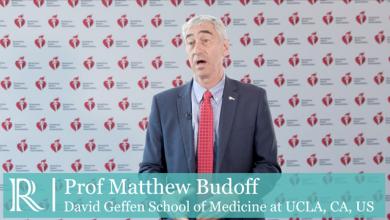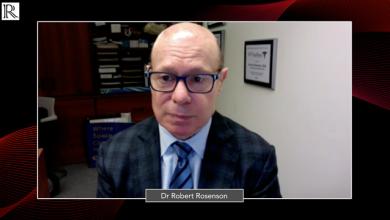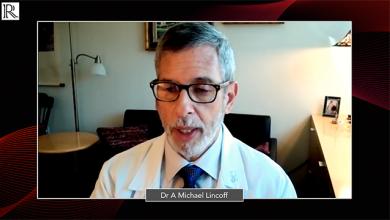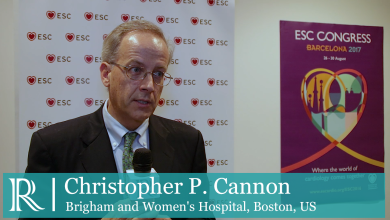Substantial progress in the treatment of atherosclerotic complications – in particular in secondary prevention – has led to a significant reduction of recurrent cardiovascular events. This has been through the use of pharmacological strategies including lipid-lowering drugs such as statins, beta-blockers, angiotensin-converting ensyme inhibitors and angiotensin receptor blockers, along with the introduction of early percutaneous coronary intervention in acute coronary syndrome with consecutive application of dual antiplatelet therapy.
Close Menu
View all - Electrophysiology & Arrhythmia
Atrial Arrhythmias
Atrial Fibrillation
Catheter Ablation of Cardiac Arrhythmias
Persistant AF using Cryoballoon
Real World Contact Force Ablation
Pacing, Defibrillators and Cardiac Resynchronisation Therapy
Stroke Prevention in Atrial Fibrillation
Ventricular Arrhythmias
Supraventricular Tachycardia
Atherosclerosis
Atherosclerosis
About
Media
Watch time: 3m 25s
Watch time: 7m 44s
Articles
Fibrates — The Other Life-saving Lipid Drugs
Citation:
US Cardiology 2004;1(1):1–6
- Abstract
- Full text
- Login or register to view PDF.
- Permissions
- References
Permissions×
For commercial reprint enquiries please contact Springer Healthcare: ReprintsWarehouse@springernature.com.
For permissions and non-commercial reprint enquiries, please visit Copyright.com to start a request.
For author reprints, please email rob.barclay@radcliffe-group.com.
For permissions and non-commercial reprint enquiries, please visit Copyright.com to start a request.
For author reprints, please email rob.barclay@radcliffe-group.com.
- Views:
 499
499
- Downloads:
 2
2
Developments in Magnetic Resonance Imaging of Atherosclerosis
Citation:
US Cardiology 2007;4(1):63–5
- Abstract
- Full text
- Permissions
- References
Permissions×
For commercial reprint enquiries please contact Springer Healthcare: ReprintsWarehouse@springernature.com.
For permissions and non-commercial reprint enquiries, please visit Copyright.com to start a request.
For author reprints, please email rob.barclay@radcliffe-group.com.
For permissions and non-commercial reprint enquiries, please visit Copyright.com to start a request.
For author reprints, please email rob.barclay@radcliffe-group.com.
- Views:
 409
409
- Downloads:
 0
0
Upstream Treatments for Atrial Fibrillation
Citation:
US Cardiology 2007;4(1):20–2
- Abstract
- Full text
- Login or register to view PDF.
- Permissions
- References
Permissions×
For commercial reprint enquiries please contact Springer Healthcare: ReprintsWarehouse@springernature.com.
For permissions and non-commercial reprint enquiries, please visit Copyright.com to start a request.
For author reprints, please email rob.barclay@radcliffe-group.com.
For permissions and non-commercial reprint enquiries, please visit Copyright.com to start a request.
For author reprints, please email rob.barclay@radcliffe-group.com.
- Views:
 147
147
- Downloads:
 0
0
- Citations: 1
Treating Atherogenic Dyslipidemia in Patients with Type 2 Diabetes—The Case for Using Fenofibrate
Citation:
US Cardiology 2005;2(1):39–43
- Abstract
- Full text
- Login or register to view PDF.
- Permissions
- References
Permissions×
For commercial reprint enquiries please contact Springer Healthcare: ReprintsWarehouse@springernature.com.
For permissions and non-commercial reprint enquiries, please visit Copyright.com to start a request.
For author reprints, please email rob.barclay@radcliffe-group.com.
For permissions and non-commercial reprint enquiries, please visit Copyright.com to start a request.
For author reprints, please email rob.barclay@radcliffe-group.com.
- Views:
 213
213
- Downloads:
 0
0














